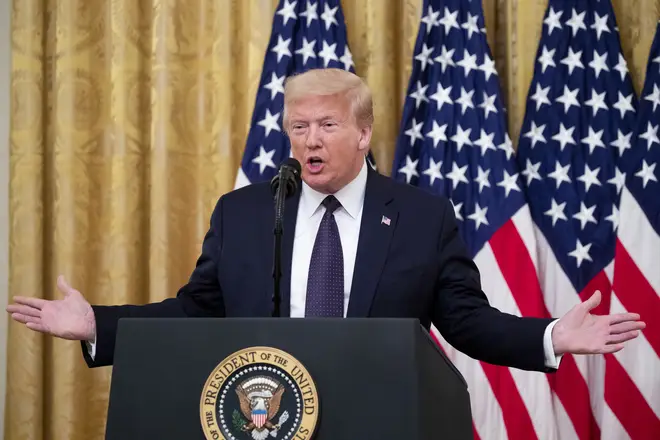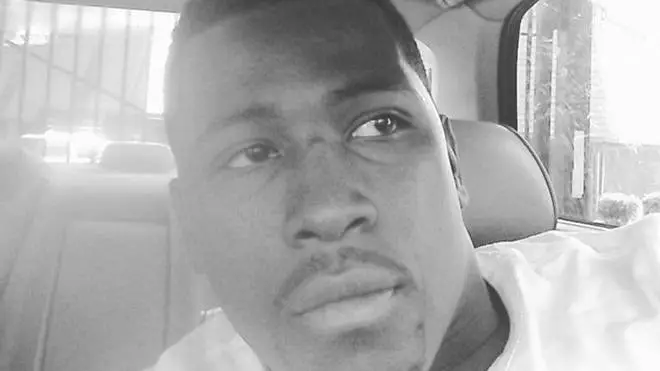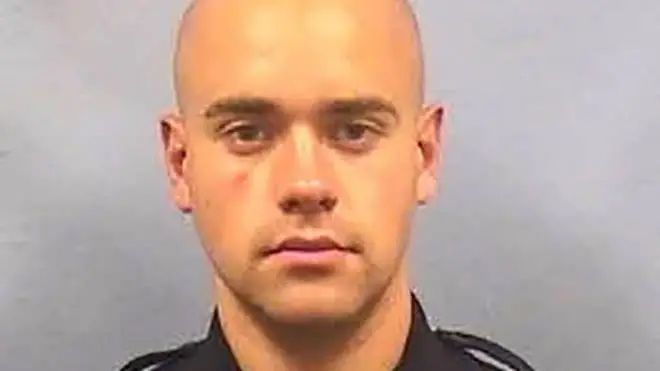
Paul Brand 3pm - 6pm
18 June 2020, 08:29

Donald Trump claimed US police are “not treated fairly” as he weighed in on the shooting of Rayshard Brooks and the officer charged with his murder.
The President said “it’s going to be up to justice” after officer Garrett Rolfe was charged with Mr Brooks’ murder on Wednesday.
During an interview on Fox News, Mr Trump said "you can't resist a police officer" and added that he had heard an explanation from Rolfe's lawyer that he had heard a sound like a gunshot and saw a flash in front of him.
The police officer shot Mr Brooks in a restaurant car park in Atlanta last week.
Mr Trump said: "I don't know that I would have necessarily believed that, but I will tell you, that's a very interesting thing and maybe that's so.
"They are going to have to find out. It's up to justice right now. It's going to be up to justice.

"I hope he gets a fair shake because police have not been treated fairly in our country. They have not been treated fairly."
Prosecutors say that as Mr Brooks lay dying, the white officer who had shot him in the back kicked him and did not give him medical attention for more than two minutes.
"I got him!" Fulton County district attorney Paul Howard quoted Rolfe as saying.
Rolfe shot Mr Brooks after the 27-year-old black man grabbed a Taser and ran, firing it from too far away to reach him, the prosecutor said, adding that the Taser had already been fired twice, so it was empty and no longer a threat.
On Wednesday, Mr Howard announced a murder charge against Rolfe and an aggravated assault charge against a second officer, Devin Brosnan, who the district attorney said stood on Mr Brooks' shoulder as he struggled for his life.
The decision to prosecute came less than five days after the killing rocked a city - and a nation - already rocked by the death of George Floyd under a police officer's knee in Minneapolis late last month.
— Donald J. Trump (@realDonaldTrump) June 18, 2020
Rolfe's lawyers said he feared for his and others' safety and was justified in shooting Mr Brooks. He opened fire after hearing a sound "like a gunshot and saw a flash in front of him", apparently from the Taser.
"Mr Brooks violently attacked two officers and disarmed one of them. When Mr Brooks turned and pointed an object at Officer Rolfe, any officer would have reasonably believed that he intended to disarm, disable or seriously injure him," the lawyers said in a statement.
The prosecutor said Brooks "never presented himself as a threat" during a more than 40-minute interaction with officers before the shooting. They found him asleep behind the wheel of his car in the restaurant's drive-thru, and a breath test showed he was intoxicated.
"Mr Brooks on the night of this incident was calm, he was cordial and really displayed a co-operative nature," Mr Howard said.
The charges reflect a potential "sea change" in tolerance for violence by police, said Caren Morrison, a Georgia State University law professor who used to be a federal prosecutor in New York.
"If they were to get a conviction, I feel like what they're saying is that policing as we know it needs to change," she said. "This I think five years ago wouldn't have been charged."

The felony murder charge against Rolfe, 27, carries life in prison or the death penalty, if prosecutors decide to seek it. He was also charged with 10 other offences punishable by decades behind bars.
Mr Brooks' widow, Tomika Miller, said it was painful to hear the new details of what happened to her husband in his final minutes.
"I felt everything that he felt, just by hearing what he went through, and it hurt. It hurt really bad," she said.
Her lawyer cautioned that the charges were no reason to rejoice.
"We shouldn't have to celebrate as African Americans when we get a piece of justice like today. We shouldn't have to celebrate and parade when an officer is held accountable," said L Chris Stewart.
The news came as Republicans on Capitol Hill unveiled a package of police reform measures and as states pushed forward with getting rid of Confederate monuments and other racially offensive symbols.
In the Minneapolis case, Derek Chauvin, the officer who put his knee on Mr Floyd's neck for several minutes, has been charged with murder. Three other officers have been charged with aiding and abetting. All four were fired and could get up to 40 years in prison.